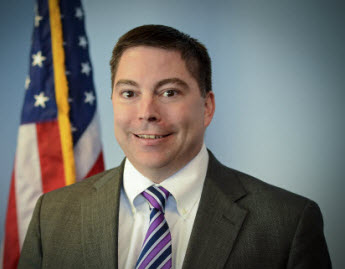O'Rielly Deems Process Review Task Force 'Diversion' and 'Time Suck'

The smarter way to stay on top of the multichannel video marketplace. Sign up below.
You are now subscribed
Your newsletter sign-up was successful
"Process reform" may be the ultimate arcane topic for policy wonks, but coming from the tongue of Republican FCC commissioner Michael O’Rielly, the lengthy list of proposals and gripes emphasize the politicization that permeates the commission today. In his mildly-titled presentation “Implementing Regulatory Reform at the FCC,” the junior-most commissioner explained his views about the "weaknesses" and ways to correct "the flaws in the mechanisms for decision-making at the commissioner or 'Eighth-Floor' level."
O'Rielly cautioned that an ad hoc Process Review Task Force, established to help the commissioners "better ...govern together," has already turned into "a mere diversion, or worse a time suck." He fretted that the disagreements within the task force "could ironically bury internal agency process reform in a death spiral of its own process."
The commissioner went out of his way to assure the friendly audience at a Free State Foundation seminar in Washington today that he did not consider the issue "as a revenge maneuver for net neutrality," and he acknowledged that "many of the procedural concerns arose prior to the current administration or chairmanship." Nonetheless, it was clear that many of O'Rielly's beefs have emerged during the heated political divisions of the continuous commission's 3-2 votes since he and chairman Tom Wheeler arrived there simultaneously nearly two years ago.
O'Rielly enunciated four "principles" for procedural reform, including improved functionality and elimination of "shortcuts" that "do not make good precedent nor promote the sustainability of decisions." He also called for greater transparency and ideas that "focus on ways to improve the process without disrupting the balance of power."
All of those points have roots in recent skirmishes at the FCC that resulted in partisan votes about spectrum auctions, broadband lifeline, IP transition and robocalling/texting.
O'Rielly also outlined nine ideas for "substantive reform," most of which again are drawn from recent political feuding about commission actions. For example, he would like to see the posting of detailed meeting items publically released in advance of the monthly FCC Open Meetings, not just distributed to the commissioners and their staffs. He also suggested that the commission "should publish any rules adopted in an Open Meeting on the same day," tied to his recommendations about restricting the "editorial privileges" and post-adoption process that allow Commission decisions to be interpreted and delayed substantially.
O'Rielly scorned the effort to "enliven the scripted open meetings by bringing in special guests," an effort he said appears to be "an attempt to further promote the viewpoint" of the commission's majority and "dilute dissenting opinions." And he challenged the "predictive judgment" process by which the agency "sometimes makes predictions about how markets will evolve and about the impact of its rules or policies."
The smarter way to stay on top of the multichannel video marketplace. Sign up below.
"Enforcement accountability" also drew O'Rielly's wrath.
"The commission has no idea whether parties are actually satisfying the terms of its enforcement actions," he said. He described "a simple fix" in building a "sufficient relationship with the Departments of Treasury and Justice, without undermining our independence as an agency."
Contributor Gary Arlen is known for his insights into the convergence of media, telecom, content and technology. Gary was founder/editor/publisher of Interactivity Report, TeleServices Report and other influential newsletters; he was the longtime “curmudgeon” columnist for Multichannel News as well as a regular contributor to AdMap, Washington Technology and Telecommunications Reports. He writes regularly about trends and media/marketing for the Consumer Technology Association's i3 magazine plus several blogs. Gary has taught media-focused courses on the adjunct faculties at George Mason University and American University and has guest-lectured at MIT, Harvard, UCLA, University of Southern California and Northwestern University and at countless media, marketing and technology industry events. As President of Arlen Communications LLC, he has provided analyses about the development of applications and services for entertainment, marketing and e-commerce.

